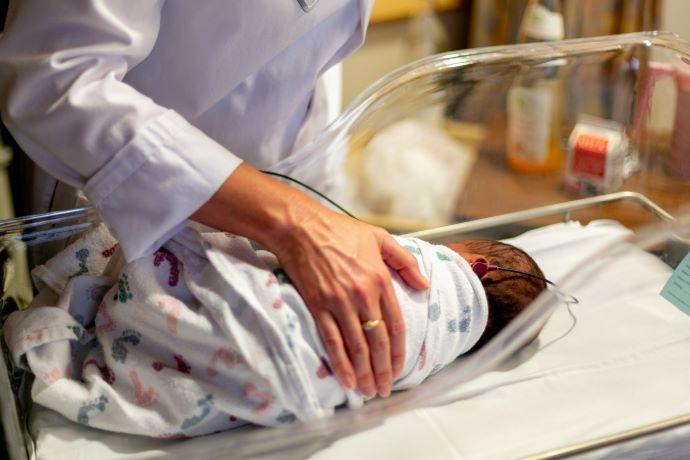The clinic reviews patients and arranges for genetic testing, allowing for a fast and more precise diagnosis and quicker access to treatments when required. The service sees young patients of all ages but predominantly looks after infants from about 6 weeks old, following the results of their first routine baby hearing test.
Hearing loss is one of the most common conditions in childhood, although uncommon in newborns. One in a thousand babies are born with hearing loss, with a genetic cause responsible in about 50-60% of cases.
Currently over 100 genes are known to contain genetic variation that cause hearing loss and different genes are associated with different conditions that have specific outcomes and potential treatments.
The new clinic offers a truly combined service, with otology, paediatric Ear Nose and Throat and clinical genetics working together in the same clinic.
Genetic testing for patients involves a simple blood test, ideally compared with a sample of the blood from both parents. The NHS East Genomic Laboratory Hub, based at Addenbrooke’s, provides the genetic test as part of the National NHS Genomic Medicine Service.
Developing this clinic paves the way for genetic testing to be integrated into many other clinical areas, providing precision diagnosis and treatment for more childhood diseases and conditions. This will underpin care in the new Cambridge Children’s Hospital, the first of its kind in the East of England.
Little Clara Fernandez, now 20 months old, was born with hearing loss which was only found after an in-depth hearing test was carried out. Clara was then invited to the new clinic for genetic testing at Addenbrooke’s Hospital. This genetic test confirmed that Clara had a rare condition which prevents the correct functioning of a crucial component of the inner ear. This condition, known as DFNB16, is caused by having a genetic variant on both copies of the gene called STRC.
Genevieve Fernandez, mother of Clara said:
“Knowing the reason for Clara’s moderate hearing loss has helped us understand why she has the condition. It was reassuring to hear that it is not usually a progressive condition.”
“The more we learn about it the more we can confidently advocate for Clara, and ensure that she receives the right support at nursery, school and into the future.
"Exploring the possibility of a genetic cause and finding an answer has helped us to process Clara's condition as a whole picture. Now that we have the answers, we will be able to share the findings with Clara when she is a bit older".
Ms Jessica Bewick, Clara’s ENT surgeon and who leads the paediatric congenital hearing loss team said:
“It’s always helpful to know the reason for any hearing loss and be confident on how it is likely to progress.
“Clara has regular reviews of her hearing and being at such a young age needs to have her hearing aid resized regularly. She is doing amazingly well and it’s great to be able to be clear on the likely prognosis of her condition so that she can get the support she needs.
“Many parents ask directly about genetic testing and this clinic allows an experienced team to discuss results in a one-stop clinic. We have the opportunity to identify patients who may benefit from new and exciting therapies in the future”
Professor Manohar Bance, Ear Surgeon from the ENT Department who leads the service said:
“Genetic testing for hearing loss is time sensitive. The ability to get a diagnosis for a child as soon as possible means that they can access the most appropriate treatment quicker and improvements can be made for them.
“Since we have included Clinical Genetics as an integral part of our service, patients have been able to receive a much enhanced service. There are many novel ways to treat hearing loss such as gene modification therapies which will have an increasingly important role in patient care and management.
“The joint service will be able to help the adoption of such treatments when they are seen to be beneficial to patients with certain genetic conditions.”
Dr. Simon Holden, Clinical Geneticist, Cambridge University Hospitals NHS Trust, said:
“The clinic provides an important bridge for the ENT, Audiology and Clinical Genetics services which allows us to optimise genetic testing and genetic counselling for patients and their families. By working together, we can provide more immediate counselling to patients and their families when this is needed.”
‘’Joint working is also particularly important when it comes to the interpretation of genetic test results, some of which, due to naturally occurring rare genetic variation, can be complex. This aspect of our work is managed through the multidisciplinary team meeting which is linked to the clinic.
Ms Jessica Bewick added:
“The development of this specialist clinic is a real step forward for families and clinicians alike.
“While Cambridge has worked to develop a detailed pathway in investigating children with hearing loss for some time, the outcome of genetic testing has always been solely in the domain of our colleagues in genetic medicine. Developing this clinic has been the final step in ensuring a comprehensive service. I hope that it is something we will be able to develop further through Cambridge Children’s Hospital.”
Image: Clara at a recent hearing aid fitting appointment with Kate Barker, Specialist Audiologist



